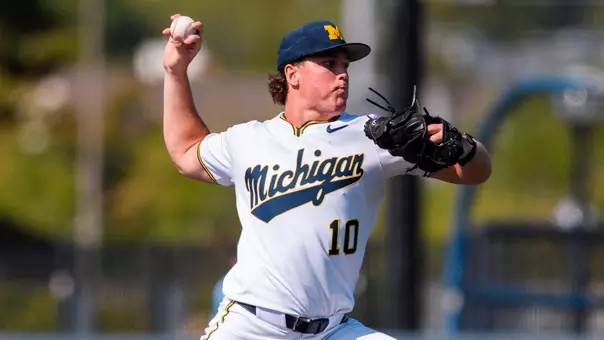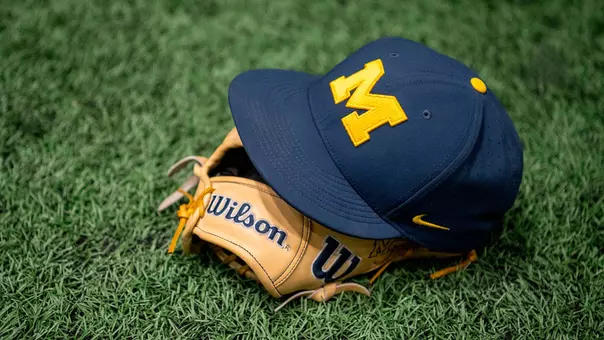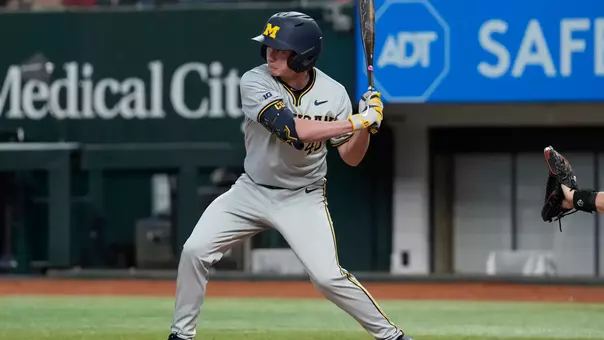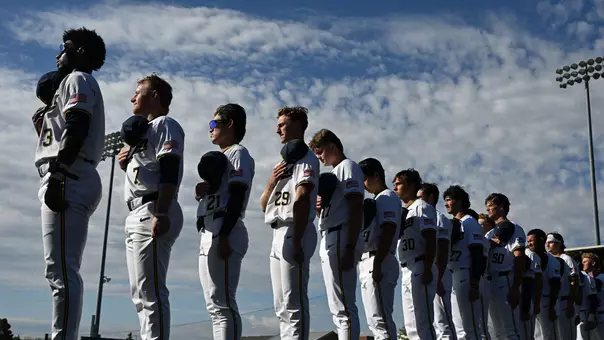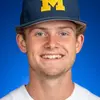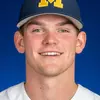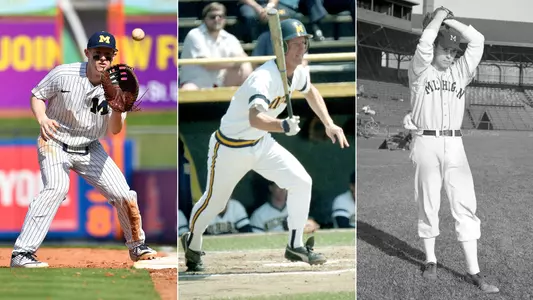
Michigan's Kerrs Become a Three-Generation College World Series Family
6/12/2019 1:30:00 PM | Baseball, Features
By Steve Kornacki
OMAHA, Neb. -- So much has changed about this town, the format for the College World Series and even the stadiums housing college baseball's showcase event.

Jimmy Kerr
But one thing has remained constant over the last six decades. The Kerr family -- possibly the only three-generation College Baseball World Series line -- keeps popping up in these big games played here.
John Kerr helped pitch the University of Michigan to the 1962 NCAA baseball championship. His son, Derek, was a catcher on the Wolverines' last two College World Series teams in 1983 and 1984. Jimmy, the grandson and son, is the slugging first baseman and captain who has helped lead the 2019 Michigan team here.
When this was mentioned to Wolverine head coach Erik Bakich, he did a double-take and said, "Really? Three generations in one family that all played in Omaha? That's unbelievable."
So, when Michigan faces No. 8-ranked Texas Tech on Saturday (June 15) at TD Ameritrade Park, the tradition will continue. And the Kerrs also have an amazing record of big-time corporate success. John became the president of Volkswagen of America and Volkswagen North America based in Detroit, and Derek is the CFO for American Airlines in Dallas.
"Jimmy's going to go into industrial engineering," said his father. "I know that."
Jimmy is batting .269 and leads the team with both 12 home runs and 56 RBI, and also made a huge defensive play by throwing out UCLA's Jeremy Ydens at the plate after hustling to retrieve the ball after a wild throw in the NCAA Super Regional championship game.
He majored in industrial operations engineering while minoring in business, and postponed an internship with investment bankers Goldman Sachs in New York to play in the College World Series and then most likely in the minor leagues. The Detroit Tigers drafted him in the 33rd round as a third baseman, where he played previously as well as second base, after Kerr displayed off-the-charts improvement as a power hitter as a senior.
The Kerrs have business drive and horse sense in their genes as surely as balls made of horsehide, bats and leather gloves.
When I mentioned the three-generation achievement to Jimmy after Michigan upset No. 1-ranked UCLA after winning the rubber game in a best-of-three series, he seemed taken by surprise.
"It's unreal -- three generations going to Omaha," said Jimmy. "That's just too much. It's unbelievable."

Kerr caught a long throw from shortstop Jack Blomgren for the final out of a 4-2 win Sunday night (June 9), and sprinted toward an area near the mound to tackle closer Benjamin Keizer and catcher Joe Donovan to begin the dogpile and celebration.
There was joy in the air at Jackie Robinson Stadium not only because Wolverine team No. 153 had won a ticket to their dreams, but because it had been 35 years since Michigan had gone to Omaha. And after bumping off the top-ranked and top-seeded Bruins, who's to say they can't actually contend for the program's first national title in 57 years?
John and Derek played in Johnny Rosenblatt Stadium back when there were only 27 and 36 teams, respectively, in what has now become a 64-team event. Jimmy will play in state-of-the-art TD Ameritrade Park, which opened in 2011, in a city that has grown in population by nearly 50 percent since Dad and Grandpa played in Omaha, now the nation's 40th largest city with 466,061 residents, according to the 2018 census.
Still, as much as almost everything has changed (they used wood bats when John played and the uniforms were baggy flannel while the gloves had considerably less webbing), one thing remains the same when Michigan comes to town. There's a Kerr on the roster.
Grandpa and Dad, proud as could be, gathered with the players and their families outside Jackie Robinson Stadium before the team bus departed after the big victory. Parents were hugging one another and players were doing likewise.
During that time of joy, I asked the Kerrs what it meant to them to see Jimmy and these Wolverines make it a third-generation experience in their family.
"It means the world," said Derek. "What these guys have done, looking like they did in those series at the end of the year against Indiana and Nebraska, and then Jordan Nwogu getting that big hit (a walk-off double) against Illinois in the Big Ten Tournament, and they just took off.
"They're on a mission right now."
 John Kerr (front row, third from left) and the 1962 NCAA national championship team.
John Kerr (front row, third from left) and the 1962 NCAA national championship team.
Grandpa's team took the mission all the way to the title.
The Wolverines beat Texas, Holy Cross and Florida State en route to the 1962 championship game -- where they defeated Santa Clara, 5-4, in an extra-inning marathon.
What did John remember most about that game?
"Winning it," Kerr said with a chuckle.
Then he continued: "Well, it was 57 years ago. And all I remember is Jim Bobel hit a triple and we played Santa Clara 15 innings and won. And what I really remember was the elation, and then we stole everything out of the locker room."
Big John -- who pitched 19 innings in two games one day during the regionals to get the team to Omaha -- chuckled heartily again.
"Those were our souvenirs of the series," he noted. "Then we celebrated all night long in the hotel. We did have a pile on the field and a little bit of elation, but not quite like these guys just did here. But in the hotel, we kept a lot of people awake. I remember that because they were complaining."
Bobel came into pitch the 10th inning in relief of starter Fritz Fisher, threw six innings of two-hit ball, and then tripled in the go-ahead run in the top of the 15th. Pitchers hit in those pre-designated hitter days. Bobel scored on a wild pitch with what turned out to be the winning run when the Broncos battled back for one run in the bottom half of the inning, but couldn't tie it.
Making the All-Tournament team for Michigan were first baseman Dave Campbell (a future major leaguer as both a player and broadcaster), third baseman Harvey Chapman, outfielder Ron Tate and catcher Joe Merullo.
They made the Wolverines two-for-two in World Series appearances, having also won it all in 1953, just five years after Rosenblatt opened.
Kerr said he wasn't wearing his '62 championship ring because "I never wore a ring, never got a wedding ring, don't even wear a watch," flashing his two hands with nothing on them.
But he does cherish that ring he was presented along with his teammates back then, and has shown it to both Derek and Jimmy.
Derek earned varsity letters on three teams beginning in 1984, but wanted to stress something about his freshman season.
"You understand I was on the '83 team," said Kerr. "Maybe they don't count that because I didn't get a letter that year, but I was on two World Series teams."
 Derek Kerr (middle row, third from right) and the 1984 College World Series team.
Derek Kerr (middle row, third from right) and the 1984 College World Series team.
Michigan beat Maine before losing to Alabama, and began its journey through the losers bracket with a wild, 11-4, win over Stanford.
What does Derek remember most about that experience?
"Just watching the guys," he said. "Casey Close hit a grand slam against Stanford, and it was amazing the guys we had on that team. It couldn't be better."
Third baseman Chris Sabo doubled in shortstop Barry Larkin with the go-ahead run in the ninth against Stanford before the hit parade continued and Close's shot turned it into a rout. Close went onto become a super-agent, representing Derek Jeter and others. Sabo and Larkin, now in Cooperstown, went onto star for the Cincinnati Reds. Sabo and outfielder Dale Sklar made the All-Tournament team.
However, the Wolverines lost their next game to Texas, 4-2, and were eliminated.
"Scott Kamieniecki was pitching that game against Texas," said Derek, "and we played well. But we ended up coming in third (place), and it was a phenomenal experience."
The 1984 World Series didn't go very well for Michigan, though. It lost to California-Fullerton, 8-4, and New Orleans, 11-3, and was gone quickly in the double-elimination event.
The games back then weren't televised and extensively analyzed on ESPN as they are now. CBS-TV didn't begin broadcasting the CWS until 1988, and ESPN took over in 2003.
That year of 1984 -- the same one during which the Detroit Tigers won Major League Baseball's World Series -- was the end of an outstanding national run for the Wolverines. They went to Omaha in five out of seven years beginning in 1978 with Rick Leach in the outfield and Steve Howe on the mound with Moby Benedict as the head coach and Bud Middaugh took over as coach and continued the success before the program wobbled for many years to come.
There have been other quality teams in the last 35 years, but despite two squads coming close (1989 and 2007), Michigan hasn't returned to Omaha until now for its eighth appearance.
There's been a Kerr in the dugout during half of the Wolverines' trips to Omaha. Who knows if, come sometime in the 2040s, if Jimmy has a son, that a fourth-generation Michigan man plays here.
But for now…
"Jimmy's done a heck of a job of keeping it going," said Grandpa with a smile and a glint in his eye. "He's smart and knows baseball, and works hard, and it's paid off for him. It's great to see.
"And Jimmy, who's doing so great right now, is getting me more P.R. than I ever got when I played. And what I did was so long ago that even I had forgotten about it."

He laughed some more.
Both Dad and Grandpa concurred that Jimmy is the best player of the three of them.
Jimmy arrived right when they were discussing that, his equipment bag on his shoulder and a wide smile on his face while he hugged every family member.
"We're bragging on you," said Grandpa.
Jimmy smiled even wider and shook his head.
Before exiting the Fisher Stadium locker room Monday (June 10), where a huge mural of the stadium and CWS statue at TD Ameritrade occupies one entire wall of the lunchroom, Kerr said:
"Me and my roommate, Ben (Keizer), have a poster in our room of Omaha, and it says Michigan has seven appearances there. We put an '8' over that when we got back to our place."

